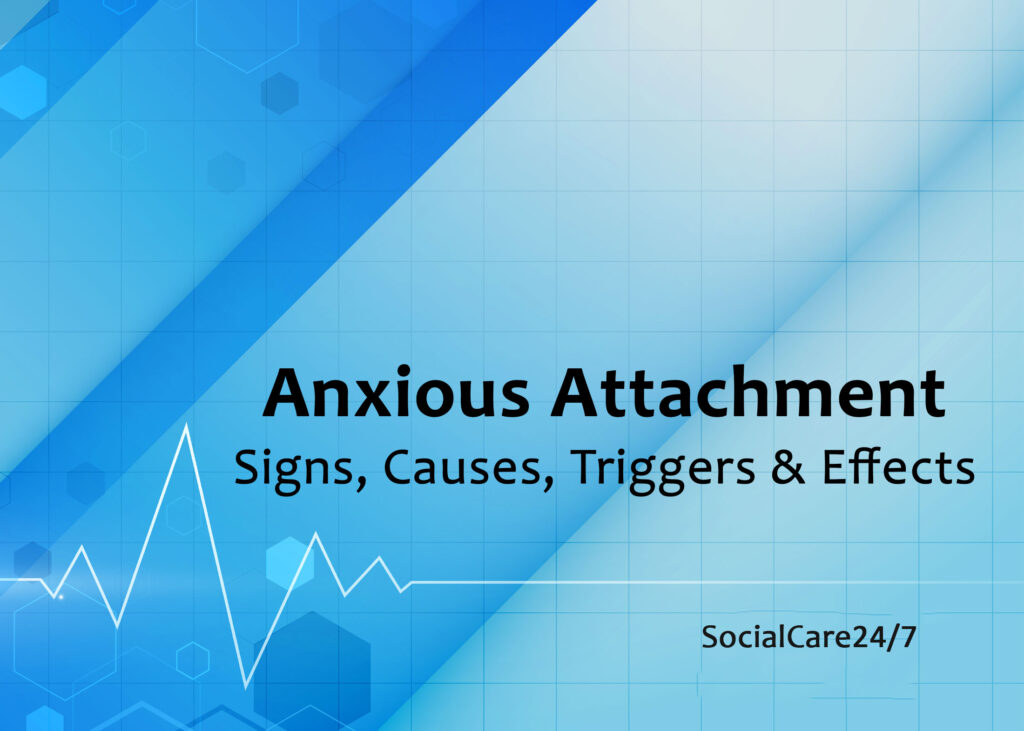Everyone worries about relationships. These sentiments might be too strong and linger too long for anxious attachment-style people, harming their mental health and relationships. Anxious attachment may affect how we interact with lovers, friends, and workplaces as adults and can begin in infancy. Anxious attachment sufferers require reinforcement constantly, worry about connections, and fear being alone.
Knowing the signs, causes, triggers, and repercussions of nervous attachment helps you understand how it impacts others and how to manage it for better relationships and personal growth.
What Causes Anxious Attachment?
The absence of consistent emotional support or comfort during early childhood interactions with providers leads to anxious attachment. This instability might make youngsters uncomfortable by questioning their carers’ loyalty. Kids have problems bonding with people since their carer doesn’t address their emotional needs, making them feel abandoned. The youngster may continually learn to seek praise and attention for safety considerations.
Also, stress, including physical or emotional abuse, might influence a child’s attachment type in the long run. If a carer is unhappy, unwell, or otherwise unavailable, the kid may create an anxious relationship to cope with not knowing how they would react.
Long-term separation from a parent or primary caretaker might cause instability and uneasy attachment. People stop trusting the caretaker to be reliable or sympathetic, which typically continues into adulthood.
Signs of an Anxious Attachment
Nervous attachment style people repeatedly express how much they require reassurance and how terrified they are to be alone. Your signs may include:
Need for Constant Reassurance
People with anxious attachments want partner approval. They may enquire, “Do you still love me?” or require their partner’s support to feel comfortable. Constant approbation may overwhelm the other person, stressing the connection.
Obsession with Partner’s Behavior
Anxious partners may constantly watch for symptoms of detachment. Even a tiny shift in conduct might make them assume their spouse is losing interest or leaving. Too much awareness can generate anxiety and panic.
View of Small Problems as Big Threats
One person might feel deeply about little interpersonal conflicts or blunders. Nervous attachment disorder sufferers may regard tiny issues as significant dangers to the relationship, which can make matters worse.
Assuming the Worst about a Partner’s Actions
A nervous connection often causes you to judge your companion immediately. A worried attachment-type partner may assume a partner doesn’t care or is losing interest if they don’t respond to a text message soon away.
Constant Worry About the Relationship
Nervous attachment makes people constantly fret about their connections. They may continually worry about difficulties and their partner leaving. The continual concern might wear them out and make them feel worse.
Triggers of Anxious Attachment
Some situations and events might worsen anxiety in anxious attachment-type persons. These triggers make individuals feel terrified and uncomfortable, which worsens their relationships.
Starting a new relationship is a significant trigger for anxious attachment. The uncertainty of a new relationship and its partner might increase anxiety. Because apprehensive attachment-type partners aren’t sure if their partners will remain or depart, the beginning of a relationship can be unpleasant. Because of these sentiments, they may continually seek support and acceptance, making it hard to form permanent relationships.
Life’s challenges can sometimes generate anxiety. Moving, changing jobs, or going through personal struggles might make you feel even less protected. People with an anxious attachment may rely on their spouse for mental support when outside issues arise, straining the connection. People require reassurance more than usual at these times, which can produce stress and tension since their spouse may feel overwhelmed or ineffective in providing continual comfort.
Effects of Having an Anxious Attachment
Long-term effects of anxious attachment on social and mental health. They may have interpersonal and quality of life issues due to these impacts.
One significant effect is tense relationships. People with an anxious attachment style worry about terrible things, distrust their partner, and dread their partner’s actions. This causes misunderstandings, poor communication, and conflicts. The need for regular reinforcement can aggravate both parties, increasing stress and conflict. An anxious attachment person may become agitated about simple things, making the connection more difficult.
Another effect of anxious attachment is lower relationship trust and enjoyment. This attachment style makes people fearful of being alone and craves acceptance, making it hard to trust their spouse. Lack of trust weakens relationships, making both parties miserable and emotionally distant.
Conclusion
Childhood anxious attachment can affect adult relationships and mental health. Nervous attachment causes people to worry, seek comfort, and fear being alone, which can strain relationships. Before recognizing and treating anxious attachment, you must understand its signs, causes, triggers, and repercussions.
Going to therapy, learning about oneself, and communicating with partners can help nervous attachment disorder sufferers improve their relationships and emotional strength. Anxious attachment is treatable. People may overcome their worries and trust themselves and others with time and effort.
Source link:
https://www.health.com/anxious-attachment-style-7562046
https://www.webmd.com/mental-health/what-is-anxious-attachment



